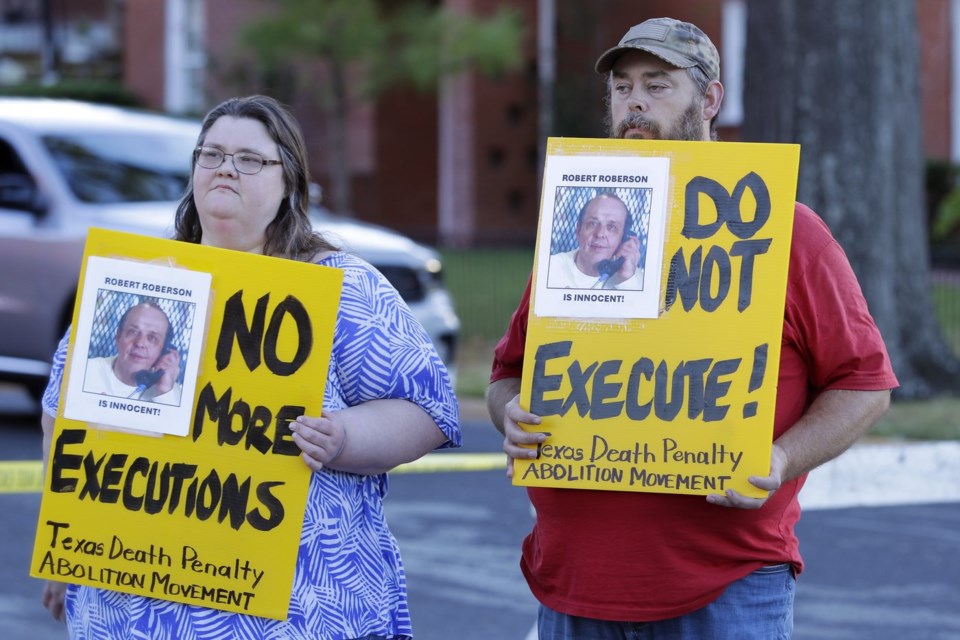AUSTIN, Texas (AP) — A Texas man whose execution was abruptly halted last week after lawmakers ordered Robert Roberson to appear at the state Capitol did not show up as scheduled Monday, following objections to transporting an inmate from death row for the extraordinary purpose of testifying before a public committee.
Roberson had been set to become the first person in the U.S. executed over a murder conviction connected to a diagnosis of . He was taken to America's busiest death chamber last Thursday but a last-ditch effort by lawmakers to buy Roberson more time stopped his execution at the eleventh hour.
Democratic state Rep. Joe Moody, the chairman of a state House committee that led efforts to stop the execution, said at the start of the highly anticipated hearing that Roberson likely would not appear but that lawmakers still hoped to do so soon.
The Texas Attorney General's Office had told lawmakers that Roberson would only appear by videoconference, which Moody said would be “poorly suited” for Roberson because he is autistic.
“That doesn’t mean Robert won’t testify at all,” said Moody, without saying when Roberson might testify or how.
Robeson's claims of innocence are backed by a group of Republican and Democratic legislators who say he was convicted based on outdated science.
Once Roberson testifies to lawmakers, prosecutors could seek a new execution date at any time, according to Gretchen Sween, one of his attorneys.
Lawmakers have sought to have Roberson transported from death row to appear in person, raising the possibility of an extraordinary scene in the Texas Capitol. However, the state attorney general's office told the committee he would appear virtually.
Republican Gov. Greg Abbott's office said the Texas Supreme Court should throw out the subpoena, writing that the House committee has “stepped out of line” in their first public statement on the case.
Rebuffed by the courts and Texas’ parole board in their efforts to spare Roberson’s life, legislators last Thursday subpoenaed Roberson to testify in an unusual tactic to buy him more time. Lawmakers on the House committee have expressed , which they say has failed to work as intended, including in Roberson's case.
The 2013 law allows a person convicted of a crime to seek relief if the evidence used against them is no longer credible. At the time, it was hailed by the Legislature as a uniquely future-proof solution to wrongful convictions based on faulty science. But Roberson’s supporters say his case points to faults in the judicial system where the law has been weakened by deliberate misinterpretation from the state’s highest criminal court.
In the last 10 years, 74 applications have been filed and ruled on under the junk science law. A third of applications were submitted by people facing the death penalty. All of them were unsuccessful.
Anderson County District Attorney Allyson Mitchell, whose office prosecuted Roberson, has previously told the committee that a court hearing was held in 2022 in which Roberson’s attorneys presented their new evidence to a judge, who rejected their claims.
Roberson was sentenced to death for the killing of his 2-year-old daughter, Nikki Curtis, in 2002. Prosecutors argued the infant's death was caused by serious head trauma from being violently shaken back and forth. Roberson's attorneys say that the bruising on Curtis' body was likely due to complications with severe pneumonia and not child abuse.
Almost 90 lawmakers across party lines, medical experts and best-selling author had called on Republican Gov. Greg Abbott to stay his execution. Abbott has not commented on Roberson's case and the Texas parole board .
___
Lathan is a corps member for the Associated Press/Report for America Statehouse News Initiative. is a nonprofit national service program that places journalists in local newsrooms to report on undercovered issues.
Nadia Lathan, The Associated Press


